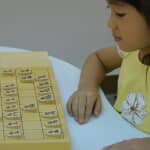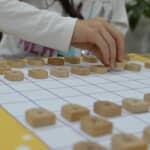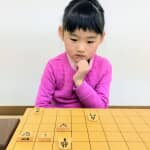24 March 2020
Ms. Akiko Nakakura Answers to Questions from Mothers Whose Children Attend Shogi Classes
It’s been almost one year and a half since we started “i-tsu-tsu Shogi classes”. In classes or events, I got many different questions from mothers whose children take Shogi lessons.
To respond to them, I will make this article Q&A session.
Q How to Practice at Home
My child had a chance to learn Shogi at an after-school program and now enjoy it very much. Unfortunately, none of our family knows Shogi very well and can help her.
I’m wondering how to study Shogi at home?
Answer:

“Mate problems, actual games, and replaying informative games” are the three major study methods to understand Shogi.
To replay an informative game, a certain level of knowledge and skills are required. I am talking about the rest two of them, mate problems and actual games.
First, regarding mate problems, there are some applications, but I think paper textbooks are more common for studying at home.
The first step for mate problems is to solve mate problems in one move. As your skills develop, the number of moves will be increased, in three moves, five moves, etc. Check the number of moves for mate problems your child is doing currently at a class and choose an appropriate book for his/her level.
For your information, if your child has just started mate problems, I highly recommend our textbook, “Mate Problems for Absolute Beginners: “Fun and Easy” Workbook for Children“, which is perfect for beginners including the very basic mate problems in one move.
Next, regarding the way to learn actual games at home, there are several ways of online methods, such as Shogi applications, computer Shogi games, or paper books dealing with Shogi techniques and tactics.
Lastly, for children who have a certain amount of skills, it’s a good idea to replay informative games. Replaying informative games is not to solve problems nor to win a game. Unlike mate problems or actual games, children may not get feelings of accomplishment by replaying games. However, with motivation and ingenuity, they can enjoy replaying games.
When your child is interested in replaying a game, you might want to consult the article posted on our website titled “Five Effective Steps for Replaying an Informative Game“, which tells you how to make the best use of the method of replaying games.
Other than those three ways, you might want to read newspaper articles or watch Shogi games on TV to learn Shogi at home.
One of my students has kept a “Shogi dairy” to keep learning records at home. I think it’s a great idea. Moms can support their child’s learning by checking the dairies.
Q Can’t Stop Playing with App
My child has got into a Shogi app and can’t stop playing. Finding home works neglected, I set a rule banning playing with a Shogi app.
Answer:

You, as parents, might not be certain to provide online opportunities to small children, even though playing Shogi online is very common today. Getting absorbed in online apps, children often neglect their home works. Losing their good eyesight is another negative effect. I feel the same as the mother who gave me this question.
Realizing the negative effects of online Shogi, we need to admit they have better points than offline Shogi.
For example, for Shogi beginner children, it’s quite difficult to recall the game from the very first move he/she played. When you play a game online, you can keep the record easily making it a Kifu notation. You, also, can have more opportunities to play a game online than offline.
It’s true that if you provide children online opportunities to play Shogi games with no measures, they could be at risk for negative effects. Even so, if you want children to develop their Shogi skills, you could set rules to play games online instead of banning them: you can play only one game a day, or you need to make greetings, etc..
I often use online systems in classes to record Kifu notations or to provide game opportunities between students in a Fuchu class and a Kobe class, which are far away from each other.
The following articles will tell you how to address online Shogi. Please use them to help children develop their skills.
How to deal with online Shogi
Five tips for children playing Shogi on the Internet
Q Losing Streak Makes My Child and Me Disappointed
After joying a Shogi class, my child has kept losing and felt discouraged. As a mother, it makes me sad.
Answer:

If you want to become a good player, the number of games you have played means a lot. It happens often that a beginner child can’t win a game just after joining a class.
That Habu, who is a great Shogi master, also couldn’t win a game the first day when he joined a Shogi class.
It must be very frustrating to lose a game. Children who lose a game must be extremely disappointed and discouraged. Besides, if children keep losing, it may well break their harts.
How children improve their skills differs between individuals. As they continue playing, their skills definitely grow at a steady pace. It’s often observed that children become able to do things that they couldn’t do before. Please watch over them expecting the pros and cons of their experiences.
It’s not practical to provide a situation in which your child can win a game but there is a lot you can do to soothe their fears and sorrows.
Related Article: Five Praise Points for Children Who Have Just Started Playing Shogi
Q My Child is Struggling to Get a Promotion
My child didn’t get a promotion after joining a Shogi class. What do instructors base their decision on? What is the standard pace to get a promotion?
Answer:

I think many instructors realize it’s not easy to have a strict criterion of judgment for a promotion. Even though rapid promotions could motivate children more strongly, they also would adversely affect children’s performance during a real game when their levels are distant from the standards in a negative sense. Each Shogi class has its own criterion and keeps improving it in realistic perspectives.
For example, we, i-tsu-tsu Shogi class, have ranks starting from the 13th. Meanwhile, there are classes that start ranks from the 20th or 30th with detailed rules or that have a system of moving down the rank.
We base our decision on students’ behaviors during playing a game, progresses in mate problems, and performances observed during games with an instructor. Some classes use the following two factors as their criteria: the number of class attendances or the results of games children played in the classes.
The rules of promotion each Shogi class possesses may have an influence on the pace of your child’s promotion. Each child could have an individual progress pace. Some may have difficulties in promoting at the beginning but later he/she could gain rapid promotions. Others may progress consistently. Who knows?
In an exceptionally rare case, there are some who reach the first dan rank within one year after starting Shogi. Actually, Mr. Araki who is teaching at i-tsu-tsu Shogi class in Kobe needed 6 months to become strong enough to play a game without a handicap of 8 pieces dropped. Another instructor said he needed 10 years to gain the first dan rank.
You and your child may well get frustrated by struggling to get a promotion. Unless you don’t lose your interest in Shogi, the patient will pay off!
Q It’s Difficult for Me to See My Child’s Progress in a Class
I know little about Shogi and can’t tell how my child develops their skills in a class.
Answer:

It’s understandable that mothers who are not familiar with Shogi know little about the system of Shogi classes. When children join a class, they are given their rank, Kyu in Japanese. The details depend on the rules of each Shogi class, and in our case, we give the 12th Kyu rank to you and then you try to get promoted, starting from the 12th Kyu to first Kyu and transitioning to Dan.
Each child has each goal such as becoming a professional player or having Shogi as a long-term hobby. Personally, I would recommend aiming to gain first dan rank.
So far, I am answering the questions from mothers whose children are learning Shogi in a class.
If you have any further questions concerning your child playing Shogi, please feel free to consult us.



